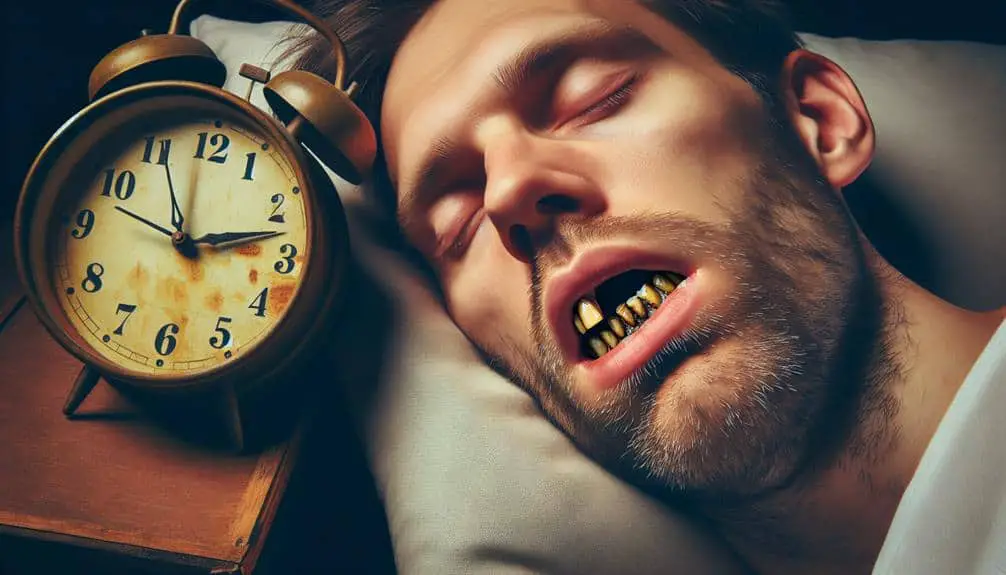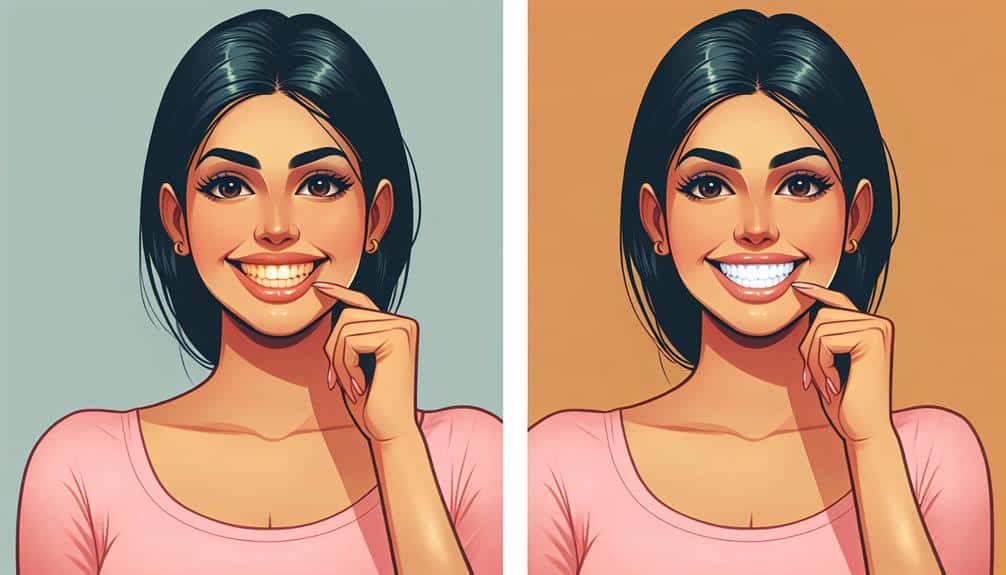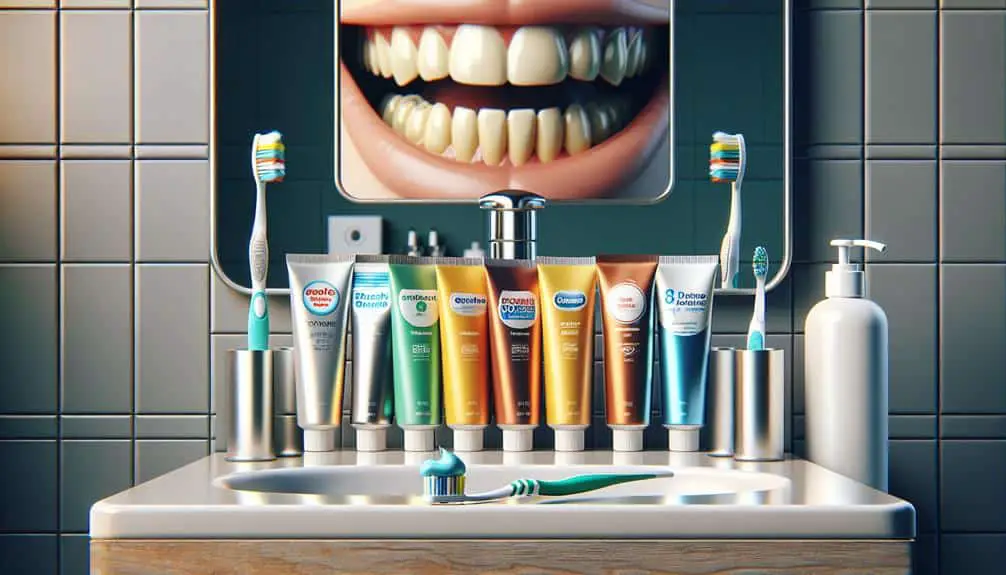If you've noticed your teeth turning yellow overnight, it could be due to various reasons. Factors like what you eat and drink, aging, and how well you care for your teeth play a role in this color change. Simple lifestyle changes such as avoiding staining foods and sticking to a good oral hygiene routine can help maintain a brighter smile. Understanding why this happens can lead you to effective solutions for keeping your teeth looking their best.
Key Points
- Overnight yellowing can be caused by diet, aging, and poor oral hygiene habits.
- DIY methods like using baking soda paste can help address overnight discoloration.
- Lifestyle changes, such as avoiding staining foods and beverages, can prevent yellowing.
- Consistent oral hygiene practices, like brushing before bed, can reduce overnight discoloration.
- Professional whitening options offer tailored treatments for significant and long-lasting results.
Causes of Overnight Yellowing
If you've ever wondered why your teeth turn yellow overnight, it's important to understand the various factors that can contribute to this sudden discoloration. One significant element is the impact of your diet on the color of your teeth. Consuming foods and beverages like coffee, tea, red wine, and certain fruits can stain your teeth over time, leading to a yellow appearance, especially if proper oral hygiene isn't maintained.
Another vital aspect to take into account is the aging factor. As you age, the enamel on your teeth naturally wears down, revealing the yellowish dentin underneath. Additionally, the dentin itself tends to darken with age, further contributing to the yellowing of your teeth over time.
Quick Fixes for Yellow Teeth
Exploring effective and safe remedies for yellow teeth can enhance your smile and boost your confidence. When looking for quick fixes, consider trying some do-it-yourself (DIY) methods that can help combat teeth yellowing.
One DIY method involves using baking soda as a vital abrasive to scrub away surface stains. You can mix a small amount of baking soda with water to create a paste, then brush your teeth with it for a couple of minutes before rinsing thoroughly.
In addition to DIY methods, addressing lifestyle habits that may contribute to yellow teeth is important. Avoiding foods and beverages that are known to stain teeth, such as coffee, tea, and red wine, can prevent further discoloration. Moreover, quitting smoking can greatly improve the color of your teeth.
Quick fixes like these can provide immediate results in brightening your smile. However, it's important to remember that maintaining good oral hygiene practices and regular dental check-ups are vital for long-term oral health and keeping your teeth looking their best.
Natural Remedies to Try
To naturally brighten your smile and combat yellow teeth, consider incorporating these effective home remedies into your oral care routine.
- DIY Whitening: Create a paste by mixing baking soda with a small amount of water to form a paste. Gently brush your teeth with this mixture for 1-2 minutes before rinsing thoroughly. Baking soda's mild abrasiveness can help remove surface stains and brighten your teeth naturally.
- Oil Pulling: Swish a tablespoon of coconut oil in your mouth for about 15-20 minutes. Spit out the oil and then brush your teeth as usual. Oil pulling may help reduce bacteria in the mouth, which can contribute to yellowing of teeth.
- Herbal Toothpaste: Look for toothpaste containing herbs like neem, clove, or sage. These herbs have natural antibacterial properties that can help maintain oral health and prevent discoloration. Using herbal toothpaste as part of your daily oral care routine may gradually help in brightening your teeth.
Preventing Overnight Discoloration
Prevent overnight discoloration of your teeth by establishing a consistent oral hygiene routine that includes brushing and flossing before bed. Dental hygiene plays an essential role in maintaining the whiteness of your teeth. Brushing before sleep helps remove plaque and food particles that can lead to discoloration overnight. Flossing is equally vital as it removes debris from between your teeth that brushing alone may miss.
In addition to dental hygiene, your dietary habits can also impact the color of your teeth overnight. Avoid consuming dark-colored beverages like coffee, tea, and red wine before bedtime as they can stain your teeth. Opt for water instead, which not only hydrates you but also helps wash away any remaining food particles.
Professional Whitening Options
To enhance the whiteness of your teeth further, consider professional whitening options provided by dental professionals who can safely and effectively brighten your smile. When exploring professional whitening options, you open yourself up to advanced treatments that can provide significant improvements in the color of your teeth.
Here are three key benefits of opting for professional whitening:
- Tailored Treatment Plans: Dental professionals can create personalized whitening plans tailored to your specific needs, ensuring ideal results.
- Potent Whitening Agents: Professional whitening treatments often contain stronger whitening agents than at-home kits, allowing for more dramatic and longer-lasting results.
- Safe and Monitored Procedures: Under the care of dental professionals during your visits, you can trust that the whitening procedures are conducted safely to protect your oral health while effectively whitening your teeth.
Frequently Asked Questions
Can Certain Medications or Medical Conditions Contribute to Overnight Yellowing of Teeth?
Certain medications and medical conditions can indeed contribute to the overnight yellowing of teeth. Medication effects and poor dental hygiene may stain teeth, while medical conditions affecting tooth enamel can also lead to discoloration.
How Does Diet and Nutrition Play a Role in the Discoloration of Teeth Overnight?
Do your dietary habits impact enamel health? Yes, nutritional deficiencies and staining foods can affect teeth overnight. Poor choices weaken enamel, making it susceptible to discoloration. Maintaining balanced nutrition and avoiding staining foods can help preserve enamel.
Is Stress or Lack of Sleep a Factor in Yellowing Teeth Overnight?
When stress impacts your life, it can affect your dental health. Poor sleep quality may lead to enamel discoloration. Maintaining a balance between stress, sleep, and oral hygiene is essential for preventing yellowing teeth overnight.
Are There Any Cultural or Lifestyle Habits That May Lead to Yellowing of Teeth Overnight?
Smoking habits, caffeine intake, alcohol consumption, and poor oral hygiene can lead to yellowing of teeth overnight. These lifestyle choices can stain your teeth, affecting their color and overall appearance. Be mindful of these habits for a brighter smile.
Can Hormonal Changes, Such as During Pregnancy or Menopause, Affect the Color of Teeth Overnight?
Hormonal changes, genetics, oral hygiene, and smoking can impact tooth color. While hormonal shifts during pregnancy or menopause may affect oral health, teeth don't turn yellow overnight. Consistent care and lifestyle choices play a role.
Conclusion
So next time you wake up to find your teeth looking like the morning sun dipped in lemonade, remember that overnight yellowing can happen due to various reasons.
But fear not, for there are quick fixes, natural remedies, and professional whitening options to help restore your pearly whites to their former glory.
Just like the dawn breaks through the darkness, you can banish the yellow from your teeth and greet each day with a bright, confident smile.



